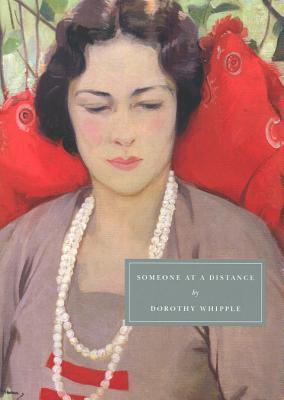First published in 2015.
After a few not very good and rather disappointing reads, I really felt in the mood for a Persephone. I adore the books which they publish, and for me, they are one of the most important publishing houses which exists today. Dorothy Whipple is an author who seems to be one of the most adored on the Persephone list, and I was eager to begin another of her novels. Someone at a Distance was first published in 1953.
Someone at a Distance is introduced by Nina Bawden, an author whose work I very much enjoy. She writes of how much she admires Whipple’s work, and says this about the novel: ‘[it] is, on the face of it, a fairly ordinary tale of a deceived wife and a foolish husband in rural suburbia not far from London and, perhaps because the author was nearing sixty when she wrote it, there is a slight pre-war flavour about the domestic expectations of the characters’. Bawden goes on to say that ‘Whipple is a storyteller in the straightforward tradition of J.B. Priestley and Arnold Bennett rather than Virginia Woolf or Elizabeth Bowen’.
I was beguiled from the novel’s very beginning. The opening chapter sets the tone of the whole wonderfully: ‘Widowed, in the house her husband had built with day and night nurseries and a music-room, as if the children would stay there for ever, instead of marrying and going off at the earliest possible moment, old Mrs. North yielded one day to a long-felt desire to provide herself with company. She answered an advertisement in the personal column of The Times‘. A young Frenchwoman, Louise Lanier, determined to spend the summer in England, is its author. Of her newest venture, Mrs North says the following: ‘”At my age, I don’t expect fun… But I hope it will be interesting. I’m too old to go in search of change, so I’ll try to bring change into the house. It’s too quiet as it is.”‘
As with a lot of the books on the Persephone list, Someone at a Distance is a familial novel. Avery North, son of the formidable matriarch, is a publisher. Ellen, his wife, is focused upon, and she is one of the most realistic constructs whom I have come across in fiction in such a long time: ‘Guiltily, pleasurably, she avoided the parties Bennett and North gave for authors, agents and the like… everybody talked vociferously, and though here and there people moved aside, smiling, to let her pass, nobody interrupted conversation for her. Slight, fair, with no idea at all of trying to make an impression, she didn’t look important and nobody wondered who she was’.
Whipple exemplifies the changing times within society marvellously: ‘Maids had disappeared from the domestic scene long ago… Ellen now did as her neighbours did and employed day, or, more properly, half-day, women’. We learn both about the North family, and headstrong Louise Lanier, as she finds her feet. Whipple’s description of her is vivid from the very first: ‘Her lips were made up, even for breakfast, in a magenta colour, which nevertheless matched the varnish on the nails of her narrow hands… What was remarkable about her, the offspring of two large, baggy parents, was her clear-cut, almost exquisite finish… Yes, she could look after herself. She was far from ordinary’.
‘Straightforward’ Whipple’s prose may be, but one is drawn in immediately. Some of the turns of phrase which she crafts are beautiful: ‘Wisteria toppled over a high garden wall in dusty mauve cascades’. This is, quite honestly, a stunning novel, and one of the best books which I have read in a long while. As an author, Whipple has an incredible amount to offer; her books provide a marvellously restful solace in our hectic world.
Purchase from The Book Depository
Advertisements Share this:




